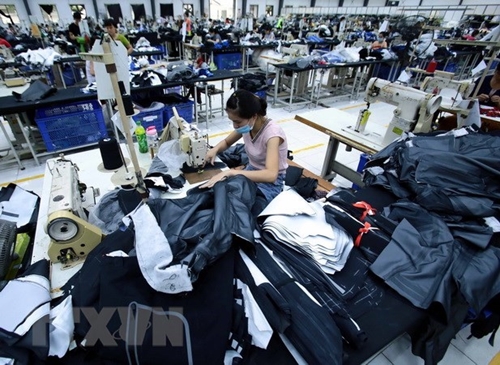At the online Vietnam-Mercosur trade conference on October 1, Deputy Minister of Industry and Trade Do Thang Hai highlighted Vietnam has enjoyed unceasing trade development with Mercosur, the world’s 5th largest economy with more than 275 million consumers and 4.58 trillion USD in GDP.
Trade between the two sides increased 2.5 times in recent ten years, from 2.45 billion USD in 2011 to 8.68 billion USD in 2019, he said, adding Vietnam exported 2.7 billion USD worth of products, and splashed out nearly 6 billion USD purchasing goods from the bloc.
    |
 |
|
Garment and textile products have potential in Mercosur market |
According to Hai, Vietnam has set up an array of dialogue mechanisms with most of the Mercosur member states, which have proved efficiency in promoting economy, trade and investment. They are working towards negotiations of a bilateral trade pact in a bid to create an equal and transparent playground for their businesses.
The COVID-19 pandemic has clobbered global socio-economic situation, making trade between the two sides fall 1.66 percent to 5.53 billion USD during January-August.
“Vietnam has put the outbreak under control while the Ministry of Industry and Trade is making efforts to enhance online trade promotion activities, give market information to local firms and foreign partners to remove bottlenecks in international trade. Those are favourable conditions for Vietnam to step up trade with Mercosur as well as balance trade with the bloc”, he highlighted.
According to Vietnamese Ambassador to Argentina Duong Quoc Thanh, economic cooperation has been a highlight in the sound Vietnam - Argentina friendship. With trade value of approximate 3 billion USD, Vietnam has been the largest trade partner of Argentina in the ASEAN bloc in recent five years, and the bilateral trade is forecast at 4 billion USD in 2020.
However, Vietnamese exports to Argentina were only valued at 500 million USD, accounting for 1.4 percent of the local import demand, he said, stressing there is huge room for Vietnamese garment and textile, footwear, furniture, handicraft, coffee, pepper and cashew.
Meanwhile, Vietnamese Ambassador to Brazil Pham Thi Kim Hoa said although Vietnamese seafood, footwear, processed food, beverage and toys have won the taste of Brazilian consumers, their market share remains small, making up of 1.5 percent of the country’s import need.
Analysis from the Vietnamese trade office in Argentina, Uruguay and Paraguay showed the two economies are complementary rather than competing, with Mercosur holding strengths in agricultural production, footstuff, industrial materials and miniral, and Vietnam’s key exports of electronics and communications products, garment and textiles and footwear.
Particularly, Mercosur has seen Vietnam as an important trade partner in the Asian region.
As Mercosur countries are re-shaping the post- coronavirus outbreak supply chain and diversify import products, Vietnamese firms have ample opportunity to boost trade to improve market share and export value in the time ahead.
Source: VNA